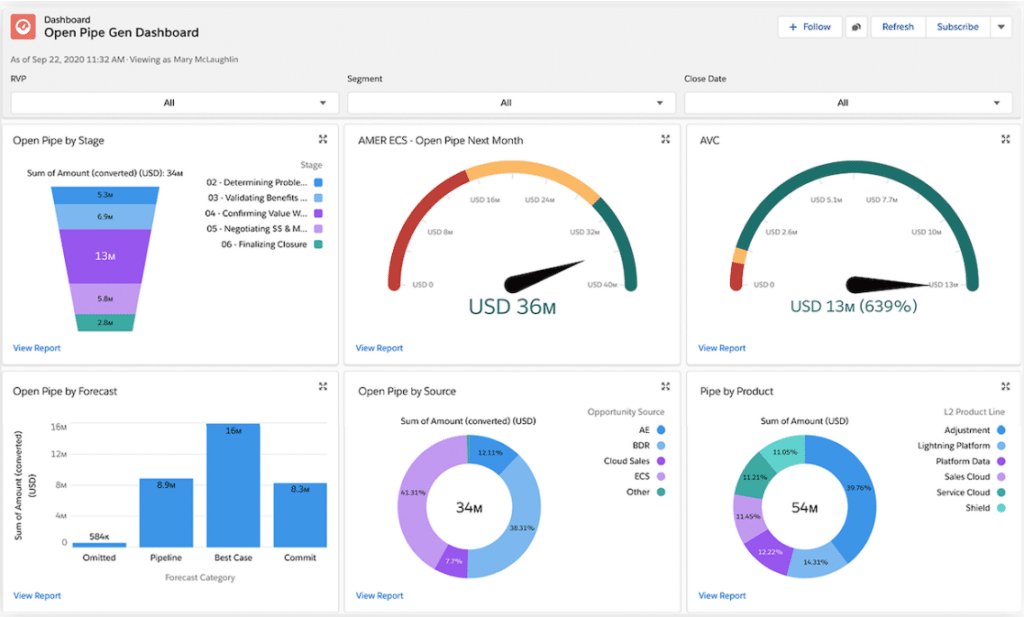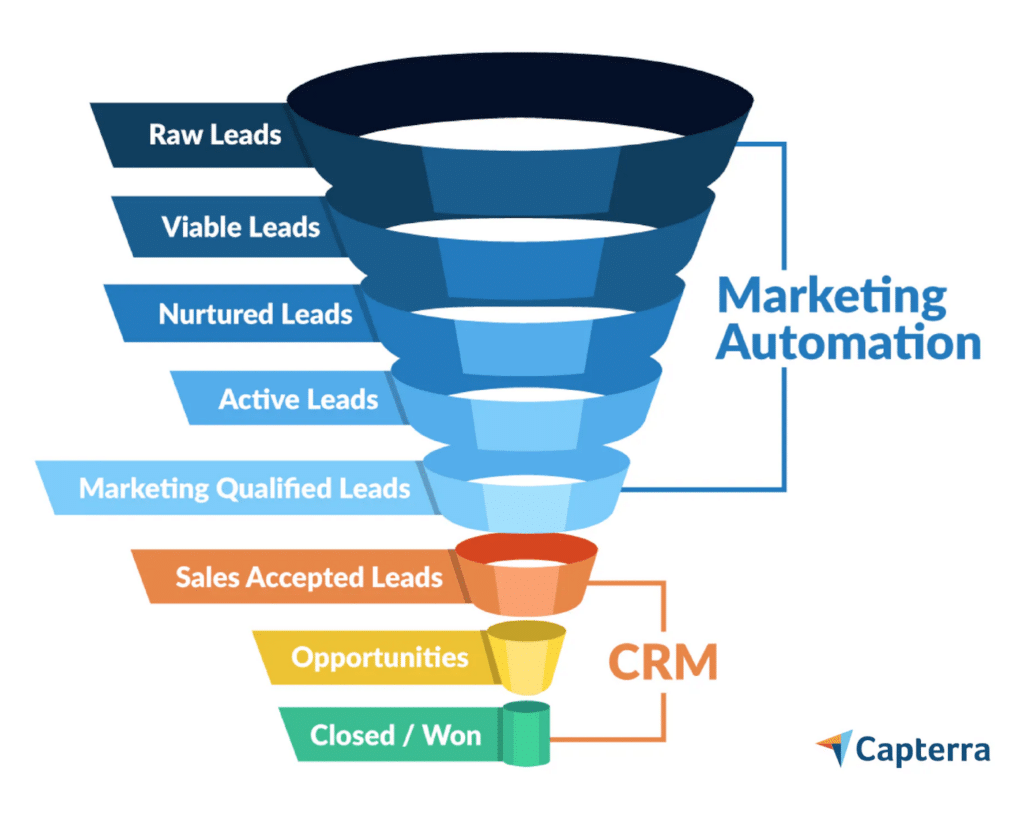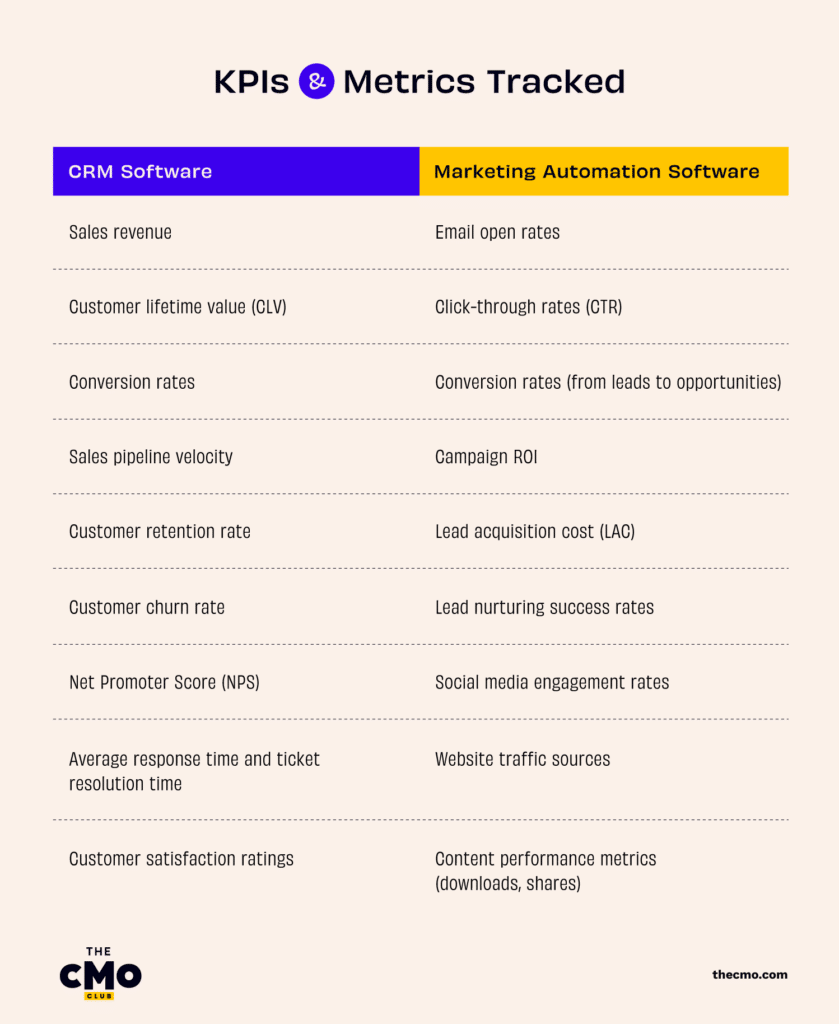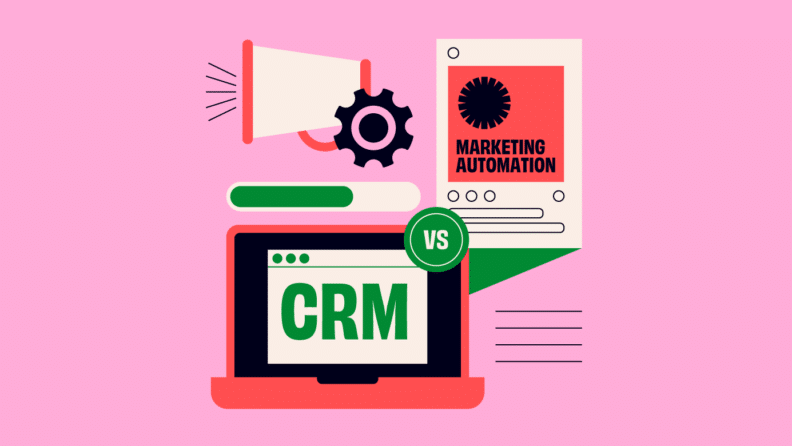Why do marketers spend their darned precious time comparing tools, such as why a CRM vs. marketing automation? Grrrr.
I posit that one reason is probably because managing a tech stack in today's turn-every-Excel-feature-into-a-tool can feel like drowning in a sea of tools. It's said there are more than 8000 vendors in the market and its still growing
It gets harder because everyone says both CRMs and marketing automation are touted as "essential." So, which do you go with as your go-to for marketing and sales efforts.
Well, let's explore the differences and benefits between marketing automation software and CRM software. Together, we'll find the best tool to improve your marketing processes, increase efficiency, and generate that sweet, sweet ROI. By the end of this article, you'll feel confident in investing in marketing automation, CRM, or both.
What is CRM?
Customer Relationship Management (CRM) software is designed to help businesses manage and analyze customer interactions and data throughout the entire customer lifecycle. The goal is to improve customer relationships, assist in customer retention, and drive sales growth.

Benefits of a CRM
CRM software is a centralized hub for all customer data, including current and potential customers. This data includes contact information, purchase history, and customer service interactions.
Integrating CRM into your marketing technology stack gives your marketing and sales teams a comprehensive view of customers, allowing them to tailor interactions to meet individual needs.
Key benefits of CRM systems include:
- Improved customer relationships: Detailed records of customer interactions help your business provide more personalized service, leading to better customer satisfaction and loyalty.
- Increased efficiency: Automating routine tasks such as data entry and follow-ups allows your team to focus on higher-value activities.
- Enhanced sales management: With better visibility into the sales pipeline, your sales teams can identify opportunities and close deals faster.
- Reporting and analytics: Access to comprehensive data enables informed decision-making, helping your business strategize and optimize marketing efforts.
As the name implies, customer relationship management software is all about building and maintaining strong customer relationships. Investing in a CRM system will help your business understand customer behavior, increase customer lifetime value, and improve the overall customer experience.
What is Marketing Automation?
Marketing automation is designed to automate repetitive marketing tasks, streamline marketing workflows, and measure the effectiveness of marketing campaigns. The goal is to increase efficiency, improve lead generation, capture and nurture leads, and enhance your marketing strategy.

Benefits of Marketing Automation
Think of digital marketing automation as the Grand Central Station of marketing channels and activities. All trains lead to your marketing automation software, including email marketing, social media management, lead scoring, customer segmentation, and campaign management.
This improves your ability to execute multichannel marketing strategies and use AI and machine learning to increase efficiency and analyze data. Marketing automation tools provide a central point for your marketing department to review key performance indicators (KPIs) from customizable dashboards.
Key benefits of marketing automation systems include:
- Improved efficiency: Automate repetitive tasks such as email campaigns and social media posting, freeing up your team to focus on strategic activities.
- Better lead nurturing: Use automated workflows to nurture leads through the sales funnel, ensuring timely and relevant follow-ups.
- Enhanced customer segmentation: Segment your audience based on behavior and demographics to deliver personalized marketing messages.
- Comprehensive analytics: Track and analyze marketing campaign performance in real-time, allowing for data-driven adjustments and optimizations.
When implementing marketing automation, your primary goal is to increase the efficiency and effectiveness of your marketing efforts. By investing in marketing automation software, your business can streamline operations, improve lead management, and ultimately drive better marketing results.
CRM vs. Marketing Automation: Differences & Similarities
With a clear understanding of CRM and marketing automation, the next step is to explore how these tools complement each other and how to leverage both to maximize your marketing success.
Review the chart below to better understand how these tools work separately and in tandem. You might also be interested in watching this informative video on the differences between CRM vs. Marketing Automation.
Here is a summary of how CRM and marketing automation are different and similar in a few core areas:
| Differences | Similarities | ||
| CRM | Marketing Automation | ||
| Primary Focus | Managing and nurturing customer relationships throughout the customer lifecycle. | Automating marketing tasks and workflows to improve efficiency and effectiveness. | Both aim to improve your ability to tailor business efforts to the customer journey and improve efficiency. |
| Goal | Improve customer retention and enhance sales processes. | Improve lead generation, capture, and scoring and automate repetitive marketing tasks. | Both seek to increase ROI and efficiency of teams by streamlining data collection and workflows. |
| Key Functions | Contact management, sales pipeline tracking, customer service, and support management. | Email marketing, social media posting, lead scoring, customer segmentation, and campaign management. | Both systems help track and manage customer interactions and engagements. |
| Data Management | Stores detailed customer data such as contact information, purchase history, and support interactions. | Manages data related to marketing campaigns, customer behavior, and lead scoring. | Both require the integration and management of large amounts of customer data. |
| User Base | Primarily used by sales teams, customer service representatives, and account managers. | Primarily used by marketing teams, including digital marketers, content creators, and campaign managers. | Both can be used across various departments, including sales and marketing, to enhance collaboration. |
| Integrations | Often integrates with email, calendars, customer support tools, and e-commerce platforms. | Often integrates with CRM systems, email marketing tools, social media platforms, and web analytics tools. | Both offer integration with other business tools and MarTech for seamless data exchange. |
| Examples of Tools | Salesforce, Creatio, SharpSpring, Intercom, Hubspot CRM. | Omnisend, Eloqua, Hubspot Marketing Hub, EngageBay. | Some platforms, like HubSpot, offer both CRM and marketing automation functionalities. |
| Analytics | Provides insights into sales performance, customer behavior, and support efficiency. | Provides insights into campaign performance, engagement metrics, and lead conversion rates. | Both offer in-depth analytics and reporting features to support data-driven decision-making. |
CRM vs. Marketing Automation: Differences
Let's take a detailed look at the major differences.
Primary Focus & Functions
Customer relationship management software and marketing automation software differ most in their primary focus and functions. CRM systems are more sales-focused, while marketing automation is marketing-centric.
This can be confusing because CRM and marketing automation leverage and store customer data. Here's the best way to think of it: CRM software collects information on leads and supports your ability to convert and care for them, while a marketing automation platform helps you generate leads, segment and prioritize the best ones, and then build campaigns and content to nurture them.
Customer Journey Stage
If we zoom out and look at the stages of the B2B customer journey CRM and marketing automation prioritize, you'll notice there's a clear difference.
As we know, a marketing automation system generates, scores, and nurtures leads. This means marketing automation deals with activities at the top of the funnel or the beginning of the customer journey. These are the awareness and interest stages in the B2B marketing funnel.
CRM takes over once you've captured, scored, and nurtured leads. For example, your marketing team may use marketing automation to create a target account list or identify marketing-qualified leads (MQLs). Once this has been achieved, your CRM system helps sales teams take those MQLs, validate them as sales-qualified leads (SQLs), and ultimately convert them into loyal customers.

Target Audience
The user base of CRM and marketing automation software differs, aligning with their primary focus and functions. CRM systems are used by sales teams, customer service representatives, and account managers.
In contrast, marketing automation platforms are mainly used by marketing departments. This includes digital marketers, content creators, and campaign managers.
However, there is some overlap as both tools can improve collaboration across teams and promote a seamless customer journey from lead generation to ongoing customer engagement.
Data Management
CRM software is designed to store and manage detailed customer information, including contact details, purchase history, and customer service interactions. The goal is to keep tabs on customers as they move through your sales process.
Marketing automation platforms also manage data but focus on data related to marketing campaigns, customer behavior, and lead scoring. Tracking this data aims to understand how leads interact with marketing content, such as which emails they open and what links they click. It's also great for driving personalization at scale.
This behavioral data allows marketing teams to segment their audience, tailor messaging, and optimize campaigns for better engagement and conversion rates.
KPIs and Metrics Tracked
CRM and marketing automation also differ in the metrics they help you analyze. It's important to understand which tool excels with the metrics you're looking to track. Key metrics tracked by CRM and marketing automation can be broken down as follows:

In short, CRM platforms emphasize sales performance, customer data management, and support efficiency, whereas marketing automation prioritizes campaign effectiveness, lead generation, nurturing, and audience engagement.
CRM vs. Marketing Automation: Similarities
And now, the similarities.
Data Centralization
Both CRM and marketing automation tools centralize data to provide a quick snapshot of your performance. This centralization improves data exchange, reporting within the sales and marketing teams, and collaboration between departments.
Data is aggregated into dashboards that can be configured and customized to showcase the metrics that matter most to your goals. This enhanced data analysis improves sales processes, marketing campaigns, strategy creation, and ROI.
No matter what you're in the market for, whether CRM or marketing automation, always look for a tool with a clean and intuitive interface. Hubspot excels in this arena for its CRM and marketing automation offerings, as its interface relies on easy-to-understand dashboards and menus.
Workflow Automation
CRM and marketing automation systems automate repetitive tasks and workflows, boosting team efficiency and productivity. CRM automates sales, customer service, and support tasks, while marketing automation automates email marketing, social media posting, lead nurturing, and campaign management.
Choose a tool that supports flexible workflow automation capabilities, allowing customization to fit your specific business processes. Look for features like workflow templates, AI and machine learning, and integration with third-party apps to streamline operations and improve team productivity.
Seamless Integrations
CRM and marketing automation often integrate with other business systems and tools, including email marketing platforms, calendars, and e-commerce platforms, to create a cohesive tech stack.
For example, integrating CRM with a marketing automation tool ensures smooth handoffs between sales and marketing. Shared access to customer data allows for more effective targeting and personalized communications.
Prioritize tools that offer a wide range of marketing integrations with popular business applications and services. Evaluate the ease of integration and compatibility with your existing tech stack to ensure smooth implementation and data synchronization.
In-Depth Reporting and Analytics
CRM and marketing automation software offers robust reporting and analytics capabilities. While the metrics tracked may differ, both tools support a data-driven approach to help your business optimize strategies and measure the success of marketing and sales efforts.
Look for tools that offer customizable reporting dashboards with real-time data visualization. Seek platforms that support advanced analytics features such as predictive analytics, cohort analysis, and attribution modeling.
Focus on Improved Efficiency and ROI
CRM and marketing automation features both prioritize improved efficiency and ROI. CRM tools focus on the sales process and funnel, using data to manage customer relationships better. Marketing automation enhances lead generation, capture, nurturing, and customer communication.
Evaluate tools based on their ability to quantify and demonstrate ROI through metrics like cost savings, revenue growth, and customer lifetime value. Choose platforms that offer performance tracking features and benchmarking capabilities for maximum reporting efficiency.
CRM vs. Marketing Automation? Which Do You Need?
Choosing between CRM and marketing automation depends on your business goals, team structure, and primary objectives. Here’s a clear guide to help you decide which tool, or combination of tools, best suits your needs:
When to Invest in CRM:
- Sales Focus: Invest in CRM if your primary goal is to manage and nurture customer relationships throughout the sales lifecycle.
- Customer Data Management: Choose CRM if you need a centralized database for storing detailed customer information, including contact details, purchase history, and support interactions.
- Integration with Sales Processes: CRM is crucial for businesses that rely heavily on sales-driven processes, such as opportunity tracking and sales forecasting.
When to Invest in Marketing Automation:
- Marketing Campaign Management: Invest in marketing automation if you focus on automating and optimizing marketing campaigns.
- Lead Generation and Nurturing: Choose marketing automation if you want to generate leads, score them based on engagement levels, and nurture them through automated workflows.
- Data-Driven Marketing Strategies: These tools provide in-depth analytics, real-time reporting, and campaign optimization features that enable marketers to make informed decisions and maximize ROI.
When to Invest in Both:
- Integrated Management: Combining CRM with marketing automation allows seamless management of the entire customer lifecycle, from lead generation to conversion.
- Unified Insights: This integration offers a unified view of customer interactions and campaign performance, aligning sales and marketing efforts for cohesive customer experiences.
- Enhanced Collaboration: Shared access to real-time data and insights fosters better collaboration between sales and marketing teams, improving lead handoffs and accelerating revenue growth.
For many businesses, integrating CRM with marketing automation offers the best of both worlds. It enables comprehensive customer lifecycle management and optimized marketing efforts to drive business growth and profitability.
Join For More MarTech Insights
Are you in the process of updating your marketing tech stack or simply looking for more marketing insights? Subscribe to The CMO Newsletter today to stay in the loop on all the latest marketing trends.




